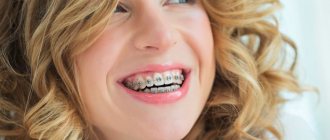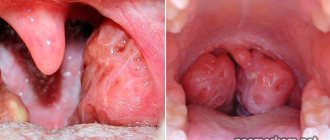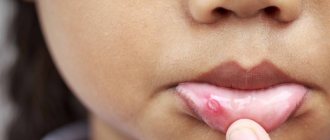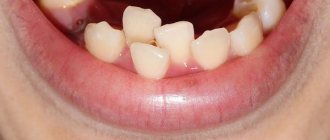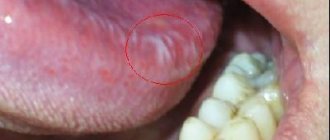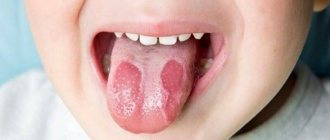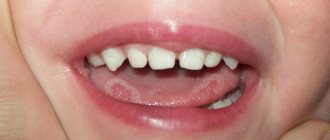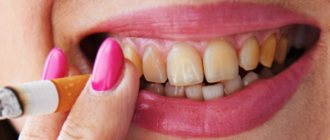The palate is a natural partition separating the mouth from the nasopharynx. It provides an important anatomical function - it is involved in chewing food, pronouncing sounds, and is also responsible for articulation. Therefore, the appearance of any uncomfortable and painful sensations brings serious problems for a person that interfere with leading a normal lifestyle.
Soreness in the palate of the mouth can indicate a wide range of problems: from the presence of external irritants that cause mechanical damage to the mucous membrane, to infectious diseases and functional disorders.
If a person has pain in the roof of his mouth, there can be many reasons. Therefore, the best way to find and eliminate them is not self-diagnosis, but contacting specialized specialists.
Key Causes of Palate Pain in the Mouth
Although there can be many causes for pain and discomfort in the palate, there are a number of common factors observed in more than 95% of symptomatic manifestations. These include:
- The development of a bacterial infection (stomatitis), causing hyperemia and swelling of the palate. Accompanied by the appearance of a specific dirty-gray plaque, ulcers and erosions on the mucous membrane, as well as bad breath;
- Pathologies of the salivary glands, provoked by the penetration and development of infection;
- Neuralgia and pathologies of the jaw joints - pain is felt both in the palate and in other parts of the oral cavity;
- Pathologies of the tonsils, tonsillitis, tonsillitis - in terms of their symptom complex, they have a similar manifestation to a bacterial infection. If not treated in a timely manner, they can cause serious consequences for human health, including: polyarthritis and myocarditis;
- Non-compliance or improper compliance with oral hygiene: mechanical injuries from a toothbrush, burns of various etiologies (physical, chemical, thermal), as well as other injuries received due to negligence;
- Unprofessional dental treatment that caused mechanical injuries to the palate, gums and bone tissue;
- Benign and malignant neoplasms. Benign formations can dissolve and burst, causing the appearance of small painful wounds;
- Leukoplakia or a precancerous condition, accompanied by discomfort in the palate, injuries to the mucous membrane and temperature fluctuations;
- A number of dental problems: pulpitis, periodontitis, advanced forms of caries, periodontal disease, etc.
Most often, the appearance of pain and discomfort in the palate is caused by advanced dental problems that have not received timely diagnosis and adequate treatment. The patient should know what to do if the palate in the mouth hurts! It is worth seeking help from professional dentists; they will determine the cause and prescribe adequate treatment.
How to treat wounds on the palate at home?
The most important thing to correctly determine the method of how to cure ulcers on the roof of your mouth is to determine the cause of this pathology. Only after identifying the root causes can you choose the most appropriate treatment. There are two types of treatment for this disease: medication and folk medicine. Let's look at each of them in more detail.
Drug treatment
It should be noted here: the prescription of medications to eliminate ulcers in the oral cavity should be carried out exclusively by a dentist.
Since only a professional doctor is able to determine the exact etiology of the disease and, based on this, prescribe the necessary medications.
We propose to briefly familiarize yourself with some drugs and means that can eliminate both the disease itself and its consequences.
- Antibiotics. Most often, this class of medications is prescribed when the disease is severe. The duration of treatment and the type of such medications are selected strictly individually.
- Two percent gel Xikain. Reduces painful manifestations and successfully fights pathogenic and inflammatory microbes, which helps wounds and ulcers heal in the shortest possible time. The use of Xikain gel is strictly contraindicated for children under six years of age. The reason for this is the presence of components harmful to the child’s body in this medication.
- Medicinal ointments. A very well proven remedy is Benzocaine ointment. Having an anti-inflammatory effect, this ointment can quickly eliminate inflammation in the mouth. This product contains analgesic components, so it is recommended to use it in the presence of pronounced pain.
- Benzocaine can cause an allergic reaction, so it is not recommended for children to treat ulcers. For them, you can use, for example, an ointment like Kamistad.
- Analgesic injections. The only really significant advantage of this type of drugs over others is the speed of action on the affected areas of the oral cavity, which makes it possible to urgently eliminate pain syndromes, especially with open ulcers, when the pain is felt most acutely. However, injections are completely ineffective in eliminating the causes that provoked the appearance of wounds inside the oral cavity.
Traditional methods
There has long been a great variety of folk methods for treating inflammatory processes in the oral cavity. Very often, such remedies are very, very effective and help make the healing process much shorter and more effective.
Let's look at a few examples of such effective remedies from the collection of folk wisdom.
- Rinsing the mouth with a salt-soda solution. It couldn’t be easier to prepare: one teaspoon of soda and salt are dissolved in two hundred grams of cold boiled water. Rinsing is done three times a day.
- Rinsing the mouth with a solution of pharmacy calendula tincture (two teaspoons per two hundred milliliters of warm boiled water). Rinse twice during the day.
- Gruel of finely grated potatoes. Applying such lotions very effectively relieves inflammation and accelerates the recovery and healing processes.
- Rinse your mouth 3-4 times during the day with freshly squeezed carrot juice, slightly diluted with boiled water.
- A very effective way to eliminate wounds on the palate and other parts of the mouth is to lubricate the affected surfaces with natural honey. This procedure will especially appeal to young children.
- Another very effective folk recipe for treating wounds on the roof of the mouth is the following remedy: mix one hundred grams of warm (preferably homemade) milk, one teaspoon of natural honey and one chicken egg yolk. Wipe the affected areas of the mouth with the resulting mixture three or four times a day. This is done using sterile gauze or a bandage wrapped around a finger and soaked in the above mixture. The course of such procedures should be carried out for at least three days.
Pain in the roof of the mouth: main symptoms
As a rule, palate pathologies have characteristic, fairly specific symptoms, which can be used to diagnose the type and complexity of the developing problem:
- The palate of the mouth swells: the surface of the mucous membrane becomes hyperemic, when pressed, elasticity is felt, similar to overgrown tissue;
- Uncomfortable sensations when eating and drinking;
- Redness appears on the upper palate;
- Pain of varying intensity is felt, intensifying upon contact with the tongue;
- Rough palate syndrome appears;
- Discomfort and pain when swallowing, which intensifies when taking hot drinks and food.
If you discover a sore on the roof of your mouth or the above symptoms, you should not start the problem or self-medicate, which can lead to serious complications! Get a high-quality diagnosis, based on the results of which a specialist will prescribe treatment.
Treatment
How to treat wounds in the mouth depends on the type of pathogen and clinical symptoms; each individual case requires special therapy. There is a general treatment algorithm that doctors use for painful mouth ulcers.
Local treatment
How to treat mouth ulcers to achieve analgesic and anti-inflammatory effects? For this purpose, there are a number of drugs that have minimal systemic effect:
Symptoms of aphthous stomatitis in children
- Sprays for treating the oral cavity - Hexoral, Vinilin, Kameton, Yox, Ingalipt. These agents effectively anesthetize the oral mucosa, reduce the level of inflammation, disinfect the epithelium, and help eliminate the infectious agent.
- Kamistad is a gel used in dental practice, which contains chamomile extract and lidocaine. It is applied to the affected areas for an antiseptic and anesthetic effect.
- Cholisal is a gel with antimicrobial, anti-inflammatory and anesthetic effects. It is used to lubricate the ulcerated mucous tissues of the mouth several times a day.
- Metrogyl Denta is a product based on metronidazole, a substance that actively fights a wide range of bacteria and viruses. Prescribed for all forms of stomatitis, applied to the mucous membranes affected by the disease.
- Actovegin is a gel that is used to treat the initial form of ulcerative lesions.
Solcoseryl gel helps to heal the inflamed mucous membrane; it should be applied to irritated areas covered with ulcers and bleeding wounds. This way the epithelium will heal and recover faster. To speed up treatment and tissue regeneration, Proposol spray, Shostakovsky balm (Vinilin), Karotolin oil solution and sea buckthorn etherol are also used.
The following agents are used to treat the mucous membrane: boric acid, a light pink solution of potassium permanganate, Kalanchoe juice diluted with boiled water, Lugol’s solution. Many patients ask whether it is possible to treat the oral cavity with hydrogen peroxide, is it dangerous? This product has a powerful antiseptic effect, stops the proliferation of pathogenic microorganisms, acts on a wide range of bacteria and viruses, but when affecting mucous membranes it must be diluted with warm water in a 1:1 ratio.
The drug can be used, but it is better not to abuse it
Drug treatment
To cure a wound in the mouth, it is necessary to find out the cause of its appearance, since different forms of pathologies require the prescription of different medications:
- Antifungal - used for pathologies caused by fungus of the genus Candida. These are Miconazole gel, Nystatin ointment, Levorin, Mycozon, Fluconazole.
- Antiviral - prescribed for viral infections, for example, herpetic stomatitis caused by the Epstein-Barr virus. The use of Interferon, Cycloferon is recommended, external treatment is indicated with Acyclovir, Tebrofenovaya, Oxolinic, Zovirax ointments.
- Antihistamines are prescribed for the allergic nature of the disease, as well as if the symptoms are accompanied by swelling and itching of the oral mucosa.
- Antibiotics – used for laboratory-confirmed bacterial infections. The choice is made by the doctor, but more often drugs from the semisynthetic penicillin and macrolide groups are prescribed.
Simultaneously with such drug therapy, you need to use any remedy for healing the mucous membrane from the list indicated above. If the disease occurs against a background of fever and severe pain, you can take drugs from the NSAID group, for example, Paracetamol, Ibufen, Nimesil. Analgin or Baralgin tablet will help relieve pain.
Rinsing
To reduce the level of inflammation, you need to rinse your mouth with the following solutions: a solution of potassium permanganate (weak), a decoction of chamomile, calendula, coltsfoot, St. John's wort, a soda-saline solution, a solution of hydrogen peroxide, a composition of salt, soda and 2-3 drops Yoda. It is necessary to rinse your mouth with a warm mixture, at least 3-4 times a day, until a positive effect is achieved.
After the procedure, it is not recommended to eat or drink for half an hour, so as not to wash off the medicinal substance from the mucous membrane and reduce the therapeutic effect. Decoctions of medicinal herbs are prepared by brewing dry raw materials with boiling water at the rate of 1 tablespoon per 250 ml of water. You can prepare a collection of herbs that have anti-inflammatory, soothing and healing effects. The herbs calendula, sage, linden, mint, chamomile, plantain, and oak bark have this effect.
The palate of the mouth is inflamed: how to treat it and where to go
Today, there are two main ways to treat pain and inflammation of the palate: at home and in a specialized dental clinic, with an ENT specialist or therapist. Treatment should be carried out only after determining the exact cause of the development of symptoms - improper treatment can only lead to aggravation of the problem.
If there are no prerequisites for serious diseases of the oral cavity: infectious, traumatic or burns, treatment can be carried out independently at home. First of all, you need to start by eliminating inflammation and pain. There are several folk and professional medical remedies that provide good effectiveness.
- To eliminate inflammation, use special herbal decoctions based on calendula and sage - they will soothe the mucous membrane and reduce swelling. Anti-inflammatory drugs can also be used. It is very important that in the first stages of treatment, inflammation is stopped and swelling is removed;
- If a pimple appears on the roof of the mouth, it is necessary to use special medications, such as: Chlorophyllipt, Chlorhexidine or Rotocan - they have a more powerful effect and limit the further spread of the inflammatory process to adjacent tissues of the oral cavity;
- If there is pain, it is necessary to use painkillers, as well as dental gels, such as Kamistad, Cholisal or Kalgel.
Particular attention should be paid to pain and inflammation of the palate caused by fungal etiology, which is accompanied by an unpleasant odor from the oral cavity. In this case, broad-spectrum antifungal agents are used; it is not recommended to treat this problem on your own.
If the cause of palate pain is aphthous stomatitis, it is recommended to use oils based on rosehip and sea buckthorn, and use propolis tincture for rinsing.
When to contact a specialist
It is necessary, however, to note that, despite the apparent effectiveness of using traditional methods of treating wounds in the mouth, still at the first signs of the appearance of ulcers, wounds or other, even the most minor, foci of inflammation in the mouth, it is necessary to immediately contact a dentist in order to obtain a qualified consultation and effective, timely and professional treatment.
Advanced diseases that have become chronic can cause various kinds of complications and are much more difficult to eliminate than those detected in time.
The roof of the mouth hurts: causes and treatment in dental clinics
The services of highly qualified specialists are an opportunity to eliminate the problem quickly and safely for health. Already at the first appointment, the doctor conducts a comprehensive examination and diagnoses the problem. This approach allows us to determine the exact cause of the development of symptoms, as well as prescribe adequate treatment, taking into account the individual characteristics of the patient.
Are you experiencing discomfort and want to treat an inflamed palate in your mouth? Contact the specialized dental clinic "Alpha Dent" in Orenburg! Our specialists will conduct a comprehensive diagnosis, determine the cause of the problem and prescribe adequate treatment!
Treatment methods
The most optimal method for eliminating residual palate defects is surgical treatment. The choice of surgical intervention technique is made by the surgeon depending on the type of original cleft palate, the size and position of the defect on the hard palate. In any case: before surgery, as a rule, it is necessary to carry out orthodontic treatment and use devices that keep the upper jaw from deformation after surgery.
Please note: one of the most difficult situations for the patient and the surgeon is the presence of an extensive defect in the hard palate. HOWEVER, modern surgical techniques are effective and fairly low-traumatic. The operation of choice in this case is plastic surgery of the hard palate with a mucomuscular flap from the back of the tongue on the anterior feeding pedicle.
